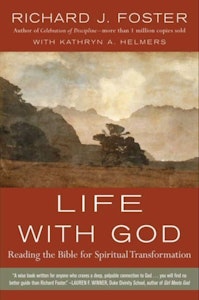Introductory Note:
In this excerpt from Life with God: Reading the Bible for Spiritual Transformation, Richard Foster and Kathryn Helmers introduce the 18th century Quaker preacher and journalist, John Woolman. Woolman’s “quiet power” came from his careful attention to God’s will and his utter submission, so that, “when the moment came for him to speak, or to act, he was already prepared to do so.”
Renovaré Team
 Excerpt from Life with God
Excerpt from Life with God
The quiet power of a life transformed by the grace of God is so explosive that it can redirect the course of human events. Consider the story of John Woolman, a successful tradesman in colonial America who pared down his business in order to live simply and fully in response to the pull of divine Grace upon his life.
Raised on a farm in a modest Jersey village, Woolman had an unusually sensitive spirit early in life, keenly attuned to the rhythms of the Divine Spirit. Although he struggled anxiously with the temptations and wantonness of youth, he was constantly aware of “the operations of Divine Love” within his own heart. His spiritual understanding was charged with awareness of God’s tender mercy and love for all living creatures. So perhaps it was no surprise that in his itinerant Quaker ministry, he became a gracious yet tireless and uncompromising advocate for concerns such as the abolition of slavery, just relations with Native Americans, an end to taxation in support of war, and refusal to benefit from consumer goods produced by slave labor and unjust trade practices.
In his classic Journal, Woolman reveals the ways in which he steadily cultivated a gentle receptiveness to “Divine Breathings” that forged his convictions and naturally led him to take a stand on them in every aspect of his life. For a wondrous picture of how the Spiritual Disciplines help reshape all of life around the divine Center, I recommend undertaking an acquaintance with Woolman through his writings. To whet your appetite, I will tell you just one story from his life.
As background to understanding the significance of this incident, it is important to know that Woolman’s convictions about the evils of slavery grew over time, as again and again he was “afflicted in mind” by this debasing treatment of fellow human beings. His Journal indicates that during this time he was spending many hours in prayer and fasting, periods of solitude and silence, meditation upon the Scripture, service, simplicity of lifestyle and speech, worship with others, and outdoor study of God’s tender love for all living creatures.
Our story finds John one November evening in 1758, being hosted in the home of Thomas Woodward after preaching powerfully against slavery at a Quaker meeting. Please be aware that at this point Woolman has earned a reputation as a gracious man, not given to sharing his opinions unless he feels divinely compelled to do so. And when he does speak, it is always quietly and respectfully, never confrontationally. Because of his humble and loving manner, he exerts an unusually powerful influence upon others.
When John enters the Woodward home, undoubtedly tired and hungry, he notices servants and inquires as to their status. When he learns they are slaves, he says not a word. Later that night, however, he quietly gets out of bed, writes a note to his host explaining why he cannot receive their hospitality, goes to the slaves’ quarters and pays them for the day’s service, and walks out into the night. His silent testimony pierces conventional attitudes and behavior like a carefully aimed arrow of the Spirit. When the household stirs to life the following morning, Thomas Woodward — over his wife’s vehement protests — sets free all his slaves. One more Friend has joined the abolitionist movement.
There are many such remarkable stories in Woolman’s living testimony against the inhumanity of slave owning. Collectively, they form a wedge applying steady pressure against the practice of slavery — first among Woolman’s own denomination, the Quakers, and ultimately throughout the Western world.
I hope this little account gives you a glimpse of what can happen when we are faithful to be “doers” of the Word, not just hearers. But make no mistake: we are doers of the Word, not doers of the supernatural work of the Word implanted in our hearts. Much heartache and grievous error results from mistakenly equating these two in our lives. John Woolman did not rise up one day and declare, “I shall be a mighty force for God against the slave trade!” and then plot a ministry plan to implement his strategic objective. No, he simply and humbly attended to Divine Breathings in the variety of means that were available to him. That is why when the moment came for him to speak, or to act, he was already prepared to do so.
Think of Woolman’s evening at the Woodward home. As a naturally shy and unassuming man, it would have been unnatural for Woolman to behave as he did. Abolitionist convictions had not yet spread among the Quakers, so having slaves did not seem cruel or out of the ordinary to most people — hard as that is for us to understand today. We can, however, understand the social pressure of convention, of blending in with the crowd. Woolman was the kind of person who shrinks from giving offense to others, especially in a way that could appear to pass judgment upon them. What gave him the strength to act against his own natural inclinations? What changed his natural inclinations into “unnatural” tendencies?
I will tell you what gave him the strength: life with God. His steady strokes of swimming in the deep waters of God’s mercy and love re-formed his natural inclinations. As his spiritual practices opened him to ever-deepening levels of transformation through the Holy Spirit, it became unnatural for him to act in ordinary human ways.


